 Christiansen c. 1952 | ||||||||||||||||||||||||||||||||||||||||||||||||||||||||||||||||||||||||||||||||||||||||||||||||||||||||||||||||||||||||||||||||||||||||||||||||||||||||||||||||||||||||||||||||||||||||||
| No. 19, 24 | ||||||||||||||||||||||||||||||||||||||||||||||||||||||||||||||||||||||||||||||||||||||||||||||||||||||||||||||||||||||||||||||||||||||||||||||||||||||||||||||||||||||||||||||||||||||||||
|---|---|---|---|---|---|---|---|---|---|---|---|---|---|---|---|---|---|---|---|---|---|---|---|---|---|---|---|---|---|---|---|---|---|---|---|---|---|---|---|---|---|---|---|---|---|---|---|---|---|---|---|---|---|---|---|---|---|---|---|---|---|---|---|---|---|---|---|---|---|---|---|---|---|---|---|---|---|---|---|---|---|---|---|---|---|---|---|---|---|---|---|---|---|---|---|---|---|---|---|---|---|---|---|---|---|---|---|---|---|---|---|---|---|---|---|---|---|---|---|---|---|---|---|---|---|---|---|---|---|---|---|---|---|---|---|---|---|---|---|---|---|---|---|---|---|---|---|---|---|---|---|---|---|---|---|---|---|---|---|---|---|---|---|---|---|---|---|---|---|---|---|---|---|---|---|---|---|---|---|---|---|---|---|---|---|---|
| Position: | Safety, Return specialist | |||||||||||||||||||||||||||||||||||||||||||||||||||||||||||||||||||||||||||||||||||||||||||||||||||||||||||||||||||||||||||||||||||||||||||||||||||||||||||||||||||||||||||||||||||||||||
| Personal information | ||||||||||||||||||||||||||||||||||||||||||||||||||||||||||||||||||||||||||||||||||||||||||||||||||||||||||||||||||||||||||||||||||||||||||||||||||||||||||||||||||||||||||||||||||||||||||
| Born: | December 20, 1928 Sublette, Kansas, U.S. | |||||||||||||||||||||||||||||||||||||||||||||||||||||||||||||||||||||||||||||||||||||||||||||||||||||||||||||||||||||||||||||||||||||||||||||||||||||||||||||||||||||||||||||||||||||||||
| Died: | June 29, 1986 (aged 57) Stanford, California, U.S. | |||||||||||||||||||||||||||||||||||||||||||||||||||||||||||||||||||||||||||||||||||||||||||||||||||||||||||||||||||||||||||||||||||||||||||||||||||||||||||||||||||||||||||||||||||||||||
| Height: | 6 ft 1 in (1.85 m) | |||||||||||||||||||||||||||||||||||||||||||||||||||||||||||||||||||||||||||||||||||||||||||||||||||||||||||||||||||||||||||||||||||||||||||||||||||||||||||||||||||||||||||||||||||||||||
| Weight: | 205 lb (93 kg) | |||||||||||||||||||||||||||||||||||||||||||||||||||||||||||||||||||||||||||||||||||||||||||||||||||||||||||||||||||||||||||||||||||||||||||||||||||||||||||||||||||||||||||||||||||||||||
| Career information | ||||||||||||||||||||||||||||||||||||||||||||||||||||||||||||||||||||||||||||||||||||||||||||||||||||||||||||||||||||||||||||||||||||||||||||||||||||||||||||||||||||||||||||||||||||||||||
| College: | Colorado A&M | |||||||||||||||||||||||||||||||||||||||||||||||||||||||||||||||||||||||||||||||||||||||||||||||||||||||||||||||||||||||||||||||||||||||||||||||||||||||||||||||||||||||||||||||||||||||||
| NFL draft: | 1951 / round: 6 / pick: 69 | |||||||||||||||||||||||||||||||||||||||||||||||||||||||||||||||||||||||||||||||||||||||||||||||||||||||||||||||||||||||||||||||||||||||||||||||||||||||||||||||||||||||||||||||||||||||||
| Career history | ||||||||||||||||||||||||||||||||||||||||||||||||||||||||||||||||||||||||||||||||||||||||||||||||||||||||||||||||||||||||||||||||||||||||||||||||||||||||||||||||||||||||||||||||||||||||||
| As a player: | ||||||||||||||||||||||||||||||||||||||||||||||||||||||||||||||||||||||||||||||||||||||||||||||||||||||||||||||||||||||||||||||||||||||||||||||||||||||||||||||||||||||||||||||||||||||||||
| As a coach: | ||||||||||||||||||||||||||||||||||||||||||||||||||||||||||||||||||||||||||||||||||||||||||||||||||||||||||||||||||||||||||||||||||||||||||||||||||||||||||||||||||||||||||||||||||||||||||
| ||||||||||||||||||||||||||||||||||||||||||||||||||||||||||||||||||||||||||||||||||||||||||||||||||||||||||||||||||||||||||||||||||||||||||||||||||||||||||||||||||||||||||||||||||||||||||
Jack LeRoy Christiansen (December 20, 1928 – June 29, 1986) was an American professional football player who became a college and pro coach. He played professionally in the National Football League (NFL) for the Detroit Lions as a safety and return specialist from 1951 to 1958. He helped lead the Lions to three NFL championships in 1952, 1953, and 1957 and was a first-team All-NFL player in six of his eight years in the league. He led the NFL in interceptions in 1953 and 1957 and in punt returns for touchdown in 1951, 1952, 1954, and 1956. His eight career punt returns for touchdowns was an NFL record until 1989 and remains the fourth best in league history. He was inducted into the Pro Football Hall of Fame in 1970. [1] Contents
After retiring as a player, Christiansen served as a football coach for 25 years from 1959 to 1983, including stints as the head coach of the San Francisco 49ers, compiling a 26–38–3 record from 1963 to 1967, [2] and at Stanford, where he compiled a 30–22–3 record from 1972 to 1976. [3] He concluded his career as an assistant coach for the Kansas City Chiefs (1977), Seattle Seahawks (1978–1982), and Atlanta Falcons (1983). Early life and collegeChristiansen was born in Sublette, Kansas, in 1928, [4] and was raised an orphan at the Odd Fellows Orphanage in Cañon City, Colorado. [4] [5] He attended Colorado A&M in Fort Collins, where he received eight varsity letters in football, track, and baseball, won three Skyline Conference championships in the quarter mile, and received all-conference honors in football twice. He graduated with a bachelor's degree in 1951. [6] Professional careerChristiansen was selected in the sixth round of the 1951 NFL draft, 69th overall, by the Detroit Lions. [4] As a rookie in 1951, he appeared in all 12 games as a defensive halfback for the Lions. In his third NFL game, playing in front of "the largest crowd ever to see a football game in Detroit" (52,907 in attendance), he returned two punts for touchdowns (returns of 69 and 47 yards) against the Los Angeles Rams. [7] Six weeks later, Christiansen repeated the feat, returning two punts for touchdowns (returns of 71 and 89 yards) against the Green Bay Packers on Thanksgiving Day in Detroit. [8] He returned 18 punts for a total of 343 yards (19.1 yards per return), as the 1951 Lions compiled a 7–4–1 record and finished in second place in the NFL's Western Division. [4] In 1952, he helped lead the Lions to an NFL championship, the second in franchise history. Christiansen returned 15 punts for 322 yards and two touchdowns, [4] and his average of 21.5 yards per punt return during the 1952 season remains an NFL record. [9] His longest return in 1952 was for 79 yards with two minutes remaining against the Chicago Bears at Wrigley Field on November 23. [10] Christiansen also played as a halfback on offense, rushing for 54 yards and a touchdown on nine carries against the Chicago Bears on December 7, [11] and for 94 yards, including a 65-yard touchdown run, against the Dallas Texans on December 13. [12] At the end of the season, Christiansen was selected by the Associated Press (AP) as a first-team All-NFL player. [4] In 1953, Christiansen helped lead the Lions to their second consecutive NFL championship. While his punt return numbers declined (eight returns for only 22 yards), he became a starter at left halfback and developed a reputation as one of the best pass defenders in the NFL. [13] He led the NFL with 12 interceptions, 238 interception return yards, and a 93-yard interception return. [4] Despite playing in only 11 games in 1953, his 12 interceptions remains tied for the fifth highest single-season tally in NFL history. [14] At the end of the season, he was selected by the AP and United Press International (UPI) as a first-team All-NFL player and was invited to play in the Pro Bowl. [4] Christiansen became an integral part of the defensive backfield, a unit that would become known as "Chris's Crew," in tribute to his leadership. He continued this high standard of play, tying for the interception lead with 10 picks-six in 1957 to help the Lions win their third title in six years. His 46 career interceptions ranks fourth on the Lions' all-time list. As a punt returner, he had 85 returns for 1,084 yards, and his 12.8 average still stands as a Detroit record and is third all-time in NFL history. He is tied with Lem Barney at 11 for the most return touchdowns in Detroit history. Christiansen still has the team record with eight punt return touchdowns. He was the first player in NFL history to record two punt return touchdowns in the same game. After winning All-Pro six consecutive years from (1952–1957) and playing in five consecutive Pro Bowls beginning in 1954, Christiansen was inducted into the Pro Football Hall of Fame in 1970. He was an All-NFL defensive back for six-straight years, played in five Pro Bowls (opening the 1956 game with a 103-yard kickoff return) and led the league in interceptions twice. Coaching careerSan Francisco 49ers In January 1959, Christiansen announced that he was retiring as a player to accept a position as an assistant coach with the San Francisco 49ers under head coach Red Hickey. [15] He served as a defensive backfield coach with the 49ers for four years, from 1959 to 1962. In late September 1963, with the 49ers in the midst of a 10-game losing streak, including all five pre-season games and the first three regular-season games of the 1963 season, Hickey resigned, and Christiansen, at age 34, took over as the 49ers' head coach. [16] [17] In that season's final 11 games, the 49ers won only twice, but held the distinction of being the only team to defeat the eventual NFL champion Chicago Bears. Over the succeeding four years, San Francisco continued to struggle, with Christiansen's best season coming in 1965 when the team was 7–6–1. The 49ers began the 1967 season with five wins in their first six games, but won only two more games the remainder of the campaign, resulting in Christiansen's dismissal on December 20, [18] ending his tenure with a record of 26–38–3. Colorado StateIn January 1968, Christiansen was hired by his alma mater, Colorado State, as a consultant to review and make recommendations concerning the university's athletic program. [19] StanfordIn April 1968, Christiansen was hired as an assistant coach under John Ralston at Stanford. [20] During this period, Stanford pulled off consecutive Rose Bowl upsets of Ohio State and Michigan, both previously undefeated. In January 1972, Ralston left to coach the NFL's Denver Broncos, and Christiansen was promoted to head coach. [21]  Christiansen spent five years as Stanford's head coach, compiling a winning record each year and a 30–22–3 overall record. He was criticized for starting Mike Cordova rather than Guy Benjamin at quarterback during the 1975 season and for switching between quarterbacks during the 1976 season. One day prior to the final game of the 1976 season, Stanford announced that it was terminating Christiansen as its head coach. [22] Kansas City ChiefsIn March 1977, Christiansen was hired as an assistant coach, responsible for running backs, under Paul Wiggin with the Kansas City Chiefs. [23] Wiggin was fired in the middle of the season, as the Chiefs compiled a 2–12 record. Seattle SeahawksIn April 1978, Christiansen was hired by the Seattle Seahawks, replacing Bob Holloway as the team's defensive backfield coach. [24] He spent five years as the Seahawks' defensive backfield coach, from 1978 to 1982. Atlanta FalconsIn February 1983, Christiansen was hired by the Atlanta Falcons as its secondary coach. [25] In January 1984, Christiansen resigned his position with the Falcons after being diagnosed with cancer. [26] Honors, family, and later yearsAfter his playing career ended, he received numerous honors, including the following:
Christiansen and his wife, Doris, had four daughters. [5] He retired from coaching in 1984 after being diagnosed with cancer. He died in June 1986 at age 57 after undergoing surgery at Stanford Hospital in Palo Alto, California. [1] [5] Head coaching recordNFL
College
Related Research Articles Super Bowl XVI was an American football game between the National Football Conference (NFC) champion San Francisco 49ers and the American Football Conference (AFC) champion Cincinnati Bengals to decide the National Football League (NFL) champion for the 1981 season. The 49ers defeated the Bengals by the score of 26–21 to win their first Super Bowl.  Gale Eugene Sayers was an American professional football halfback and return specialist in the National Football League (NFL). In a relatively brief but highly productive NFL career, Sayers spent seven seasons with the Chicago Bears from 1965 to 1971, though multiple injuries effectively limited him to five seasons of play. He was known for his elusiveness and agility and was regarded by his peers as one of the most difficult players to tackle. 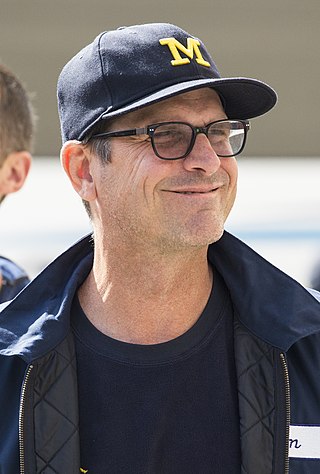 James Joseph Harbaugh is an American professional football coach and former quarterback who is the head coach of the Los Angeles Chargers of the National Football League (NFL). He previously served as the head coach at the University of Michigan from 2015 to 2023, the San Francisco 49ers from 2011 to 2014, Stanford University from 2007 to 2010, and the University of San Diego from 2004 to 2006. Harbaugh played college football at Michigan from 1983 to 1986 and in the National Football League (NFL) for 14 seasons from 1987 to 2000, with his longest tenure (1987–1993) as a player with the Chicago Bears. 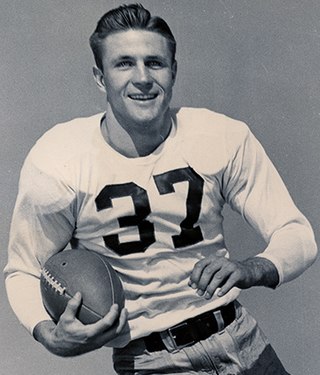 Ewell Doak Walker II was an American professional football halfback and kicker who played with the Detroit Lions of the National Football League (NFL) for six seasons from 1950 to 1955. He played college football for the SMU Mustangs, where he won the Heisman Trophy in 1948.  Lemuel Jackson Barney is an American former professional football player who was a cornerback and return specialist for the Detroit Lions of the National Football League (NFL) from 1967 to 1977, playing occasionally as a punter as well. He played college football for the Jackson State Tigers from 1964 to 1966. He was selected by the Lions in the 1967 NFL/AFL draft and played. He was selected as the NFL Defensive Rookie of the Year in 1967, played in seven Pro Bowls, and was selected as a first-team All-NFL player in 1968 and 1969. He was inducted into the Pro Football Hall of Fame in 1992. He has also been inducted into the Detroit Lions Hall of Fame, the Jackson State Sports Hall of Fame, the Michigan Sports Hall of Fame, and the Mississippi Sports Hall of Fame. 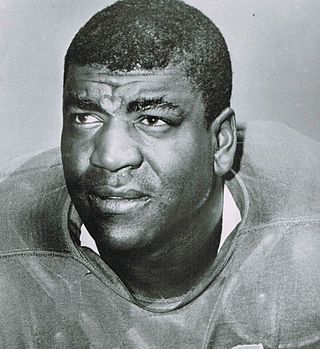 Richard Lane, commonly known as Dick "Night Train" Lane, was an American professional football cornerback who played for 14 years in the National Football League (NFL). He played for the Los Angeles Rams (1952–1953), the Chicago Cardinals (1954–1959), and the Detroit Lions (1960–1965).  Robert Yale Lary Sr. was an American professional football player, businessman, and politician. He played for 11 seasons as a safety, punter and return specialist for the Detroit Lions of the National Football League (NFL). He was inducted into the Pro Football Hall of Fame in 1979 and was also selected for the NFL 1950s All-Decade Team. 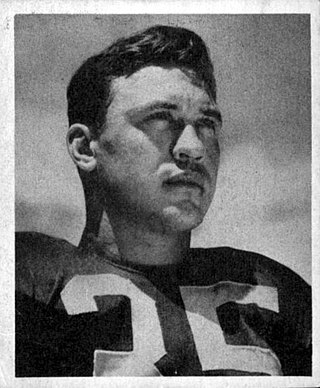 William McGarvey Dudley, nicknamed "Bullet Bill", was an American professional football halfback, safety and return specialist who played in the National Football League (NFL) for the Pittsburgh Steelers, the Detroit Lions, and the Washington Redskins. He was inducted into the Pro Football Hall of Fame in 1966 and the Virginia Sports Hall of Fame in 1972.  Joseph Paul Schmidt was an American professional football player and coach. He played as a linebacker in the National Football League (NFL) for the Detroit Lions for 13 years from 1953 to 1965. He won two NFL championships with the Lions, and, between 1954 and 1963, he played in ten consecutive Pro Bowl games and was selected each year as a first-team All-Pro player. He was also voted by his fellow NFL players as the NFL's most valuable defensive player in 1960 and 1963, named to the NFL 1950s All-Decade Team, inducted into the Pro Football Hall of Fame in 1973 and chosen as a member of the NFL 100th Anniversary All-Time Team in 2019.  Robert Stanton Waterfield was an American professional football player and coach. A skilled player, he played in the National Football League (NFL) for eight seasons, primarily as a quarterback, but also as a safety, kicker, punter and sometimes return specialist with the Cleveland / Los Angeles Rams. He played college football for the UCLA Bruins. He was inducted into the Pro Football Hall of Fame in 1965. His No. 7 jersey was retired by the Rams in 1952. He was also a motion picture actor and producer.  John Henry Johnson was an American professional football player who was a running back. He was known for his excellence at the fullback position as both a runner and a blocker. His first professional stint was in Canada in the Western Interprovincial Football Union for one season with the Calgary Stampeders. He then played in the National Football League (NFL) for the San Francisco 49ers, Detroit Lions, and Pittsburgh Steelers before spending his final season in the American Football League (AFL) with the Houston Oilers. Commonly referred to as simply John Henry, an allusion to the folk hero of the same name, Johnson was a tough and tenacious player who performed at a high level well into the tail end of his career.  Cloyce Kennedy Box was an American professional football player and businessman. He played five years in the National Football League (NFL) with the Detroit Lions, was a member of NFL championship teams in 1952 and 1953, was selected as a second-team All-Pro in 1950 and a first-team All-Pro in 1952, and played in the 1951 and 1953 Pro Bowl games. On December 3, 1950, he set Detroit team records with 12 catches, four touchdown receptions, 24 points, and 302 receiving yards. He later became a successful businessman in the oil and gas business in Texas.  Earl Harry "Dutch" Clark, sometimes also known as "the Flying Dutchman" and "the Old Master", was an American football player and coach, basketball player and coach, and university athletic director. He gained his greatest acclaim as a football player and was inducted into the College Football Hall of Fame with its inaugural class in 1951 and the Pro Football Hall of Fame with its inaugural class in 1963. He was also named in 1969 to the NFL 1930s All-Decade Team and was the first player to have his jersey retired by the Detroit Lions. 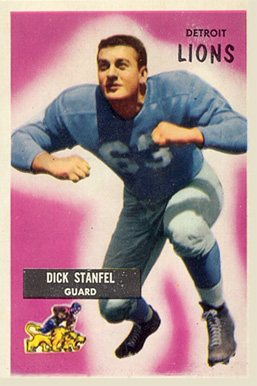 Richard Anthony Stanfel was an American professional football player and coach in the National Football League (NFL). He played as a guard, and his college and professional career spanned more than 50 years from 1948 to 1998. He was inducted into the Pro Football Hall of Fame as a player in 2016. He was also named to the NFL 1950s All-Decade Team. 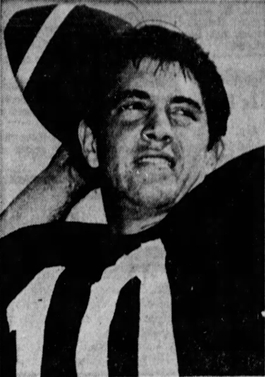 Patrick Lewis Studstill Jr. was an American professional football player who was a wide receiver, punter and return specialist. He played 12 years in the National Football League (NFL) for the Detroit Lions (1961–1967), Los Angeles Rams (1968–1971), and New England Patriots (1972). He led the NFL with 457 punt return yards in 1962. In 1966, he led the league in both receiving yards (1,266) and punting yards (3,259). He also tied an NFL record in 1966 with a 99-yard touchdown reception. LaVern Earl "Torgy" Torgeson was an American football player and coach. He played college football for Washington State from 1948 through 1950. Torgeson played professionally in the National Football League (NFL) for seven seasons, principally as a linebacker, for the Detroit Lions from 1951 to 1954 and for the Washington Redskins from 1955 to 1957. 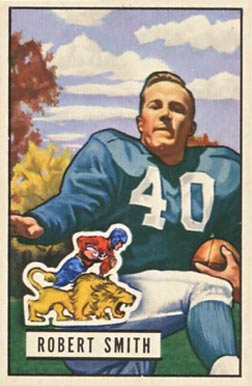 James Robert Smith was an American football defensive back, halfback and punter. He played in the National Football League (NFL) for the Detroit Lions from 1949 to 1954. He played for NFL championship teams in Detroit in 1952 and 1953 and was selected as a first-team All Pro after the 1952 season. He also played in the All-America Football Conference (AAFC) for the Buffalo Bills (1948), Brooklyn Dodgers (1948), and Chicago Hornets (1949). Smith played college football for the Tulsa Golden Hurricane, the Iowa Pre-Flight Seahawks (1944), and the Iowa Hawkeyes (1946–1947). The 1957 Detroit Lions season was the franchise's 28th season in the National Football League (NFL) and their 24th as the Detroit Lions. Under first-year head coach George Wilson, the Lions won their fourth and most recent NFL title. The 1953 Detroit Lions season was the franchise's 24th season in the National Football League. The Lions won their second consecutive and third overall National Football League (NFL) championship. In their fourth year under head coach Buddy Parker, the Lions compiled a 10–2 record during the regular season, outscored opponents 271 to 205, finished in first place in the NFL's Western Division, and defeated the Cleveland Browns 17–16 in the NFL Championship Game at Briggs Stadium in Detroit. The 1952 Detroit Lions season was the franchise's 23rd season in the National Football League. The Lions won their second National Football League (NFL) championship, having won their first championship 17 years earlier in 1935. The team's co-captains were halfback Robert Hoernschemeyer and defensive tackle John Prchlik, and defensive end Jim Doran was selected as the team's most valuable player. In their third year under head coach Buddy Parker, the 1952 Lions compiled a 9–3 record during the regular season, finished in a tie with the Los Angeles Rams for first place in the NFL's National Conference, defeated the Rams in a tiebreaker game, and defeated the Cleveland Browns, 17–7, in the 1952 NFL Championship Game at Municipal Stadium in Cleveland. References
External linksWikimedia Commons has media related to Jack Christiansen .
This page is based on this Wikipedia article Text is available under the CC BY-SA 4.0 license; additional terms may apply. Images, videos and audio are available under their respective licenses. | ||||||||||||||||||||||||||||||||||||||||||||||||||||||||||||||||||||||||||||||||||||||||||||||||||||||||||||||||||||||||||||||||||||||||||||||||||||||||||||||||||||||||||||||||||||||||||